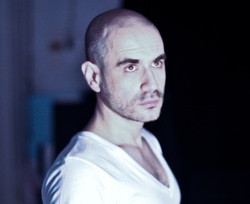 Jonathan Goldstein Jonathan Goldstein’s writing has appeared in The New York Times Magazine and Nerve. He is a columnist for the National Post and a frequent contributor to the PRI’s This American Life. He’s the author of the short story collection Ladies and Gentlemen, The Bible! and the novel Lenny Bruce is Dead. His CBC Radio show, WireTap, is now it its ninth season. In his most recent book, I’ll Seize the Day Tomorrow, Goldstein recounts the highs and lows of the last year in his thirties. RUSTY TALK WITH JONATHAN GOLDSTEIN Melanie Chambers: What is your writing process like? Jonathan Goldstein: I’m fortunate to have the radio producing aspect of the job to toggle between, so when writing isn’t coming as easily, there’s always other things to do such as cutting tape, hopping in and out of the studio—sometimes they’re welcome. And sometimes they can be distractions. It’s hard to tell when you should just push through or give up and do something else. Lately, in terms of process, I’m in the middle of writing a monologue to be spoken by a train conductor. The premise is kind of absurd: as the train is pulling into Penn Station, he announces that all the toilets of New York City and the five Burroughs have been shut down by authority of the New York Toilet Authority. The NYTA. It’s a ridiculous premise, but more often than not, the most satisfying part of writing is actually hearing the work performed by the people that we’re getting to do it. For example, this week’s show I wrote a part for a 14-year-old and found this talented boy named Ezra to perform this piece about falling in love and negotiating your friends during that time when you’re a teenager. I just heard the final mix of it yesterday and that was really gratifying because it turned out really nicely; sometimes they don’t turn out as well as when you hear them in your head, but this time it really matched the way I heard it in my head which is really satisfying. MC: You’re prolific in print and radio. Which do you prefer? JG: It really depends. Having the opportunity to write for different venues can really help access different parts of your brain and inspire different ideas. Last summer I was given a chance to go to Bali for a travel website, and I had never done anything for them before, and the editor was great in the sense that he liked my writing and pretty much had given me carte blanche to write about whatever I wanted to. And having that kind of opportunity you want to step up to it. One of the difficult things about writing for WireTap for so many years—and it creeps up on you—is the persona begins to take over. You become very good at writing in a particular kind of voice. I think of that line of Kurt Vonnegut’s about being careful about the things you pretend to be because you become that thing. I know how to write a particular kind of thing well enough to get the job done in a certain context. It’s a great thing, and it’s the benefit of age, but it can also sort of trap you so having the opportunity of writing for another venue and step outside of the persona can really be exciting. It’s sort of like going away on a vacation and then coming home; I always think of the radio show as a kind of coming home. And I like writing for This American Life too because I love writing for my friends who work there—imagining them reading it and trying to make them laugh and thinking about the things that will make them laugh. It’s kind of like a performance and that can really be fun too. Writing for print, you can be more digressive, and you can try to do things that maybe on the radio you’d fear. On the radio you’re taking people by the hand and you constantly want to be sensitive to the fact that quite possibly they are multi-tasking: sitting in traffic, doing dishes. You want to keep them on board whereas writing for the page you have someone’s undivided attention. I guess you can attempt different kinds of things because of that. MC: What is your first memory of writing creatively? JG: I started writing at a very young age. And I think I was lucky enough to know that was what I liked to do. My first memory is of writing a poem in grade five and having the teacher have me read it out loud in class. What connected me [to that moment], was the actual act of reading it out loud; hand-in-hand with my first experience with writing was performing the writing, if you want to call it that. I think it was the first time I ever felt that kind of specialness. I wasn’t a great student, and I felt like it was the first time that everyone in the class was looking at me but in a positive way and the teacher was singling me out. I remember that feeling of being looked at in that particular kind of way. That was a new feeling and I think I liked it. I think it’s also connected to how my mind works: I’m not very good in the moment, and I’m the kind of person who thinks constantly, regretful about the things I should have said. Writing is a way of slowing down time and getting it right in a way—revisiting the past and having the time to pour over a particular moment. And, do it justice in retrospect. As far as being an introvert, when I think about my truest self, which always takes us back to childhood, I think about a kid by himself in his room. Coming into my 40s, I think I enjoy people. I think now I feel freer with people. I feel more comfortable expressing my enjoyment of people. That’s all there is. There is a great quote I remember Tom Wolfe speaking on 60 Minutes. He said: “our soul is our relationship to other people.” I think it’s true. That’s kind of why it’s worth going out into the world. MC: What do you think about the Internet print medium, and what will it do to print journalism? JG: The first book I ever published was from Coach House in Toronto; they do small experimental titles. This was back in the 90s, maybe even the mid 90s, and I remember the guy who ran the press, now in retrospect I realize he was quite forward looking, but the Internet was something quite new, and he was discussing the possibility of maybe publishing my book as an e-book. I never even heard of such a thing, and I didn’t know the commerce of it all. They had an authors’ tip jar you could put your credit card in, and I remember thinking, this doesn’t appeal to me. I wanted to get published. I wanted to have a book. It was so synonymous with being out in the world and being published. And I remember he referred to the book as the fetish object known as the book, and it just seemed so far thrown to me and now it doesn’t seem as crazy. And, in fact, I love reading on my iPhone. I don’t have an iPad and I don’t have an e-reader. It’s [iPhone] in my pocket, and I’m obsessed with reading, so this way when I’m on the subway or eating, I can always be reading something. The last thing I read on my iPhone was The Onion AV Club. MC: Where did you come up with the idea and why did you decide to write about turning 40? JG: I guess that was the next thing that was happening and that was an easy pitchable single sentence kind of thing. Had I been turning 30, I don’t think it would have had the same type of gravity. But, the truth is, not much changes. The book starts on that note or sort of how most of the time we’re not thinking about how old we are and we kind of are all ages at once. I think the irony in writing about turning 40, the conclusion that I came to, is that I guess you’re never going to feel as though you’ve arrived. I mean 40 when you’re 20 means a different thing then when you’re at 40. So which definition do you adhere to? I’m thinking of a particular episode of Taxi, a great show from the 80s. Bobby [a taxi driver] had given himself five years in New York to become an actor and this was the week that the five-year limit was up. So, he goes on a binge of auditions in the hopes of giving it a big push, and at the end of the week, he gets no callbacks and nothing happens. It’s kind of a sad moment, then he picks up his head, and says, “you know what? I’m going to give myself another five years.” You might think, my life isn’t where I thought it would be at the end of my 30s, but life isn’t over and you can give yourself more time—it’s a gift to yourself. No one can count you out as long as you don’t count yourself out. There is a lot of unhappiness brought about thinking you have to be at a certain place. Look at Michelangelo’s early sculptures verses the later stuff. If you look at an early pieta, like when he’s in his early 20s, it’s like showcasing every single thing that he could do, and it’s incredible. The later stuff is simpler; it’s like he has less to prove. There depth that comes out of that, too. MC: What is your advice for young writers? JG: The 20s are a good time for living, and you’re going to be drawing from that later on. You might as well be pursuing your passions and figuring what the hell you want to do so that maybe in your 30s you can get going in some real way, but maybe that’s my experience because I didn’t have a job in the field I wanted to work in until my 30s. Sometimes it’s easy to be dismissive of the things that you’re naturally good at or to undervalue them. And I’m thinking of Edgar Allen Poe. He always wanted to be a poet. He looked at his short stories, a genre that he kind of invented, as just a means to paying the bills. I don’t think he took it as seriously. But, in the final analysis, it doesn’t matter. And, I also think what separates the pros from the amateurs is being able to write in spite of inspiration—when it doesn’t feel like a hot time and you’re struggling through something. And again, there’s a nice democracy there because I’ve written things that were like pulling teeth that ended up being as okay as say something that I wrote in a moment of inspiration. Sometimes those things that you write in the moment of inspiration are really fun, in and of themselves, to have written them. The experience was great, but it doesn’t really mean they were great. That is a thought that keeps me going because on some days I think, how can I possibly be writing anything of worth when I’m feeling as poorly as I do or just not feeling good about what I am writing? But just knowing that if you put it aside and then look at it some time afterwards, you might be surprised. 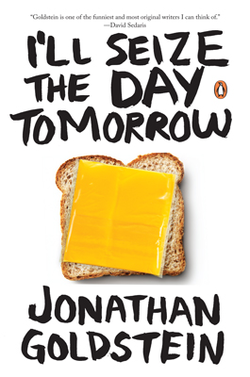 JONATHAN GOLDSTEIN'S MOST RECENT BOOK I'll Seize the Day Tomorrow, Penguin Canada, 2012 Description from the publisher: I'll Seize the Day Tomorrow is the story of Jonathan Goldstein's journey to find some great truth on his road to forty. In a series of wonderfully funny stories, the host of CBC's WireTap recounts the highs and lows of his last year in his thirties. Throughout the year, Goldstein asks weighty questions that would stump a person less seasoned. For example: What is it about a McRib that drives people crazy? Can we replace extending an olive leaf with extending an olive jar? How much wisdom can we glean from episodes of Welcome Back, Kotter? His friends and family, many of them known through their appearances on WireTap, weigh in with hilarious results as Goldstein eats, sleeps, and watches bad TV all the way to his date with destiny. Melanie Chambers is a travel, food, and nonfiction writer and teaches at Western University. 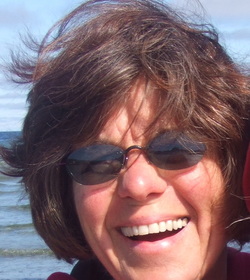 Cornelia Hoogland Cornelia HooglandPhoto by Hennie Aikman Woods Wolf Girl (Wolsak and Wynn, 2011) is CORNELIA HOOGLAND'S 6th book of poetry, and is based on the fairy tale, Red Riding Hood. Fountainhead Theatre in London Ontario is producing Red’s Canadian premiere in May 2013. Hoogland’s poetry, as well as her nonfiction, fiction and plays have been published and performed internationally. Cornelia has received writing awards from the Canada Council, Ontario Arts Council and selections from her 6 books of poetry, two chapbooks and nonfiction have won numerous literary competitions and have been shortlisted for various CBC literary competitions, the Relit awards, and the National Magazine Awards. Cornelia has taught writing and literature at the University of Western Ontario, UBC Okanagan, Simon Fraser University, and has led seminars, workshops and tutorials at festivals and school districts. She lives on Hornby Island with her visual artist husband Ted Goodden and dog Drummer. Visit Cornelia online at her website, at her Woods Wolf Girl site, and on Facebook. RUSTY TALK WITH CORNELIA HOOGLAND Kathryn Mockler: What is your first memory of writing creatively? Cornelia Hoogland: I remember tracing the colour blue from its starting point above the clouds, to the mountains, the ocean, the Douglas-fir trees, grains of sand, the beach towel and then the colour splintering into my child’s blue eyes. Speaking of one thing in terms of another – what a miracle is metaphor. The blue poem took place at Rathtrevor Beach on Vancouver Island 35 years ago. I lost that poem and yet—have lived it all these years. Following where the line, idea, colour, word takes me. KM: Why did you decide to become a poet/writer? CH: I received my first diary—one inch by two inches—when I was six. I wrote “Dad bought me a comic.” I am a journal keeper still. Every morning I get up and try to scratch out a few fresh lines. At the Banff Centre for the Arts, Adele Wiseman told my group: “You are all professionals; you’ve all sacrificed to be here in this program. You can call yourself a poet.” Okay, I thought. KM: Who are you reading now? CH: Dean Young, Tony Hoagland, Elizabeth Bishop and many other American poets both living and dead. Canadians Nancy Holmes, Julie Berry, Matt Radar. Alice Oswald, Jack Gilbert, David Harsent writers I admire. My daily literary experiences are often online, however. I read Poetry Daily and follow up the poems onto the Amazon or Google sites where I can read (often) more poems. KM: What do you feel influences your writing the most? CH: My antenna for lines, images, verbs, rhythm, dynamics, juxtaposition. Always on the look-out for the next poetic bread crumb. Reading and hearing other poets, and listening to children. Children say the best things, but I have a long ways to go to hear them properly. I also attend to wolves, dogs, crows. Learning how to write nature poetry, or use natural images, is one of our biggest literary challenge today. KM: Can you describe your writing process? How does revision figure into the process? CH: In writing and editing Woods Wolf Girl (Wolsak and Wynn, 2011), I realized more deeply than I did before the complex relationship between experience and form. Although the poems were written as monologues (Red, Mother, and the Woodsman), finding their voices was by way of delving more deeply into my own. KM: What is the best piece of writing advice you’ve been given that you use? CH: Understanding that poetry is a set of strategies (such as pattern, affect, density). Poetry doesn’t exist to teach us how to live (although it might) or even to show us the world we inhabit (though it might). Poetry is the dynamics of released energies, a dramatization of shaped energies. KM: What is your favourite or funniest literary moment, if you have one? CH: As the director of Poetry London in London, Ontario, I experienced many hilarious moments. Despite detailed emails to visiting poets outlining the program, the expectations, the times, directions and so forth, actually getting the writers from their cities to the London podium could involve tens of emails, an intricate cell phone game the days before and of the reading, great poetic anxiety about directions and schedule, food sensitivities revealed once seated at the restaurant, amazing requests to be driven to antique shops or delicatessens, and so forth. What I loved was the moment said famous authors walked on stage, they were immediately professional, engaging, charming, mannered and poised. The audience loved each of them; in fact, the more troublesome ones were the most sensational! Amazingly, hosts across Canada do similar work on any given night of the week and all for free. KM:Tell us about your play, Red. CH: Red is having its Canadian premiere on May 10–18, 2013, in London Ontario. Fountainhead Theatre is producing the play (John Gerry, director). Tickets available at onstagedirect.com I started writing the play using scenes from Woods Wolf Girl, but the play quickly took on a life of its own and bears little resemblance to the book. Red Riding Hood’s multiple identities throughout the ages, and the plethora of attitudes toward her inform this play. Innocent, sexual, chaste, (chased), unchaste, the girl to blame, fearless, the girl who ‘asked-for-it’, Red (the girl) is also the wolf, the wilderness is inside her. The character Red is not limited in costume, posture, attitude, or age. Arguably the world’s most popular, and most retold, fairy tale, interpreted into countless versions in over 40 different countries over the past nearly 400 years, it transcends cultural barriers. Red takes up complex human concerns, such as how good girls grow up, relationships between mothers and daughters, and the ongoing tensions between agent/victim, eating and/or being eaten. Who is caged, who is protected? (This play is suitable for high school audiences and adults.) For more information please see http://www.facebook.com/cornelia.hoogland. KM: What are you working on now? CH: Once again I am turning to the fairy tale for my inspiration. My multimedia project titled Woods Wolf You: A SoundWalk, is an audiowalk through the woods. Aimed to help create ecological awareness in young people as well as feelings of connectedness—ironically using the very technology (personal stereos) often blamed in alienating people from the physical world—the audio walk conjoins the technologies of sound, the power of the fairy tale Red Riding Hood, and site-specific performance. I’m delighted that London’s own Baseline Press will be publishing my chapbook, Sea Level, in 2013. Sea Level was shortlisted for the CBC literary nonfiction awards in 2012. Karen Schindler is creating one of the most exciting chapbook presses in Canada, and I’m delighted. 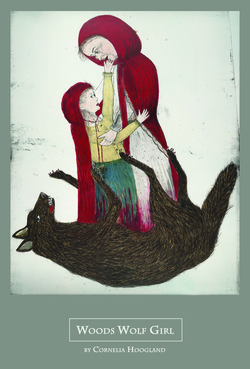 CORNELIA HOOGLAND'S RECENT POERTY BOOK Woods Wolf Girl, Wolsak and Wynn, 2011 From the Publisher: Cornelia Hoogland takes the story of Little Red Riding Hood and turns it inside out in this sensuous Canadian retelling. The woods and wolves are vivid and real, while Red herself is anything but a one dimensional girl-child. A meditation on innocence and its loss, and on the power of the green wilderness, Woods Wolf Girl uses striking lyric poetry to expose the heart of the original fairy tale. About Woods Wolf Girl: “Red Riding Hood like you’ve never encountered her before. Hoogland has nailed it in this chilling contemporary retelling of the age-old tale. Layered and smart as hell.” (Jeanette Lynes). Woods Wolf Girl is an arresting new book of poems from Cornelia Hoogland. The plot that threads through the poems draws from Red Riding Hood, but the story is ultimately Canadian. It is a lyrical work that exposes the wilderness of the Canadian landscape to a new immigrant, and shows the equally dangerous transition from girlhood to womanhood. Woods Wolf Girl retells the journey from mother’s house to grandmother’s house through the woods from the points of view of the girl and her immigrant mother. These poems occur on the path of experience: experience that may lurk in the form of wolf/men--who are especially dangerous to good girls. While the wolf is ultimately bad news (and then simply tired news, as in the scene in the grocery store), he initiates the girl into experience, the good with the bad. 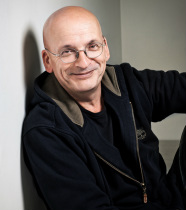 Roddy Doyle Photo by Mark Nixon Roddy Doyle was born in 1958. His work includes The Commitments, Paddy Clarke Ha Ha Ha (Booker Prize, 1993), The Woman Who Walked Into Doors, A Star Called Henry, and Bullfighting. His latest book is Two Pints (2012). A new novel, The Guts, will be published in August, in Ireland and the UK, and early 2014 in the USA. He divides his time between Dublin and confusion. RUSTY TALK WITH RODDY DOYLE Kathryn Mockler: What is your first memory of writing creatively? Roddy Doyle: I was about ten, I think, and my teacher, Mr. Kennedy, told the class to write something about a rainy day. This was Ireland, remember, so deep research wasn’t necessary. There were fifty-four boys in the class, and it was the first time we’d been told to write, or compose, anything—to make it up. I wrote about boredom. Mr. Kennedy looked over my shoulder, then read it to the class. KM: Why did you become a writer? RD: I loved reading. I loved football—soccer—but was a hopeless player. I loved music but hadn’t the patience or ability to learn an instrument. But I was literate, so writing seemed like an easy option. I forced myself into the habit, the routine. KM: What is the best writing advice that you’ve gotten that you actually use? RD: Treat it as a job; don’t expect magic. KM: How do you approach revision? RD: If by ‘revision’ you mean editing, I love it. So I approach it with a full heart and a red ballpoint. I tend to, deliberately, write too much. Editing is often a case of paring back. I’m fascinated, and sometimes worried, about how the deletion or addition of a word can alter meaning, tone, everything. When I’m editing, I put all other work aside and concentrate only on the pages I’m editing. I don’t play music, and I often lose track of time. KM: Your books often come out within a few years of each other. Do you work on multiple projects at the same time or stick to one project until it’s complete? Do you have difficultly switching from one genre to the next—particularly from adult fiction to children’s literature? RD: I work on different projects at the same time; I divide my working day, about 9am to 6pm, into chunks. As long as the projects are very different, they don’t tend to infect each other. I play a different type of music for each project. I could, I suppose, change shirts too, but that might be going too far. So, I can work for several hours on a novel, save it, hang out the washing, make a cup of coffee, change the Rolling Stones for Steve Reich, and get working on a treatment for a possible TV series or a book for children. KM: What writers were influential when you first started writing? Who are you reading now? RD: I think Flann O’Brien was important, particularly the Dublin dialogue in At Swim-Two-Birds. E.L. Doctorow’s Ragtime was important—the simplicity of the language. I’ve just finished George Saunders’ collection, Tenth of December; I think it’s magnificent. I’m reading a collection of J.G. Ballard interviews, called Extreme Metaphors. It’s great. KM: Given the amount of books that you’ve written, it seems impossible to imagine, but do you ever get writer’s block? And if you do, how do you overcome it? RD: No—never. KM: Do you ever abandon projects? If so, how do you know when it’s time to move on? RD: I’ve never abandoned, but I’ve parked projects for a while, stayed away from them until I was ready to look at them with that mixture of calm and excitement that I need if I’m going to work. Because I work on several things during the day, if one project isn’t going well, I can focus on another. KM: We often talk about the difficulty of rejection for writers but what about the problems that success can bring? After you won the Booker Prize in 1993 for Paddy Clarke Ha Ha Ha, for instance, what was it like sitting back down at the writing desk? RD: Success, however we measure it, is much nicer than rejection. But rejection can be like fuel to an almost empty engine. Rejection is a cousin of determination, and it’s part of the job. Success is too, if you’re lucky. The trick is, I think, to ignore it when you’re at your desk. I never let myself think that, just because I’ve won a prize, I’m not capable of writing shit. After winning the Booker, I couldn’t wait to get back to work. I love the work. KM: You posted your latest work Two Pints, which was just published in its entirety in November, as a serial on Facebook over the last year and half. Why did you decide to do this and what was the process like for you? Did the process have any affect on the end product? In other words, did the reader comments influence revisions? Would you do it again with another project? RD: I wrote the Two Pints pieces for fun. Someone suggested they’d make a good book, so—grand. It’s an accidental book, and still fun. I still write the Two Pints pieces, when the mood hits me and I have time. I often compose them as I’m walking, say, from the city centre, home. I type them up, make sure they’re less than 200 words, then post them on Facebook. I like the near-spontaneity of it—very different from how I normally work. It’s a little madness. I didn’t revise them, so reader comments, while nice, had no influence on them. I’d never be tempted to put work-in-progress up on Facebook. I don’t want to know what readers think until I know the work is finished. KM: What are you working on now? RD: I’ve just finished a novel, called The Guts. It’ll be out here and the UK in August, and the USA early in 2014. I’m writing a short story, about a man who’s injured when another man, in Lycra, cycles into him. I’m also working on a treatment for a possible TV series. ‘Possible’ is code for ‘It’ll never be made.’ I’m enjoying the job. Later this year, a musical based on my book, The Commitments, will go into rehearsal. I wrote the script, the ‘book’, so that will take up a lot of my time. I’m very excited about it. I’m tempted to say ‘I can’t wait’ but, actually, I can—just. 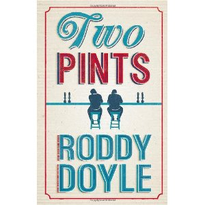 RODDY DOYLE'S LATEST BOOK Two Pints, published by Jonathan Cape, Vintage Publishing, 2012 Description from the publisher: Two men meet for a pint in a Dublin pub. They chew the fat, set the world to rights, take the piss… They talk about their wives, their kids, their kids’ pets, their football teams and--this being Ireland in 2011–12--about the euro, the crash, the presidential election, the Queen’s visit. But these men are not parochial or small-minded; one of them knows where to find the missing Colonel Gaddafi (he’s working as a cleaner at Dublin Airport); they worry about Greek debt, the IMF and the bondholders (whatever they might be); in their fashion, they mourn the deaths of Whitney Houston, Donna Summer, Davy Jones and Robin Gibb; and they ask each other the really important questions like ‘Would you ever let yourself be digitally enhanced?’ Inspired by a year’s worth of news, Two Pints distils the essence of Roddy Doyle’s comic genius. This book shares the concision of a collection of poems, and the timing of a virtuoso comedian. 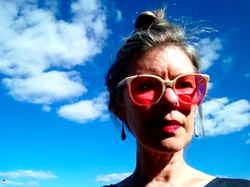 Lisa Robertson For many years LISA ROBERTSON has worked across disciplines and often in collaboration. With the late Stacy Doris she was the Perfume Recordist, an ongoing sound performance and writing project with work in the new I'll Drown My Book: Conceptual Writing by Women. She worked as The Office for Soft Architecture, publishing reports, essays, walks and manifestoes as well as curating and cooking as OSA. Currently she is translating the French linguists Emile Benveniste and Henri Meschonnic with Avra Spector. Her most recent book of poetry is R's Boat, from University of California Press, and Bookthug published a new book of essays, Nilling, in spring 2012. She lives in rural France, and teaches at Piet Zwart Institute in Rotterdam. RUSTY TALK WITH LISA ROBERTSON Kathryn Mockler: What is your first memory of writing creatively or being creative? Lisa Robertson: I think my earliest creative acts were acts of deception and truth bending—petty theft, rebuttal, cover-up. This led directly to writing. KM: Could you describe your writing process? (For example, do you write every day? When? Where? How do you approach revision, etc.) LR: Everyday I sit in an armchair and write in a notebook as I read. If somebody gives me resources I leave the armchair and travel to read in an exotic library. Writing on trains and airplanes on the way to and from these libraries is a special pleasure, because so much anticipation and repletion is involved. Talking to my friends usually shows me how to work with the material I have gathered. My dearest friends are the ones I simply obey. KM: How would you define experimental writing? LR: I wouldn't define experimental writing. It would cease to be experimental then. KM: What influences your work? LR: Unanswerable questions. Unanswerable to me that is. Right now I am trying to understand the movement a triangle sections, and I am trying to understand the humoural system of medicine. Put more simply, desire influences my work. KM: What have you read recently that excites you? LR: I just spent a month reading at the Warburg Institute in London, for 6-8 hours a day, six days a week. Everything excited me. I was reading about the relationships between geometry, astronomy, optics, and medicine in the ancient world, until the baroque era and Johannes Kepler's work on the elliptical orbits. I wanted to understand the dynamics of the ellipse, and I wanted to understand science as a relational query into the structure of the cosmos, rather than a recitation of the mechanics of cause and effect. Plato's Timeaus is hallucinogenic in that respect. So is Kepler's The Six-Sided Snowflake. So is medieval Arabic optics. These studies are enticing me to draw more, and that is a pleasure. In terms of recent poetry—Erin Moure's translations of Galician poet Chus Pato, Aisha Sasha John's new work, Angela Carr, the American poet Chris Nealon, and Francis Ponge. I read Ponge as a contemporary. KM: What is the best piece of writing advice you've heard or been given that you actually use? LR: Writing is the good use of boredom. I try to have a boring life. I don't socialize, and I eat nine servings of vegetables a day. KM: Your funniest or favourite literary moment, if you have one. LR: When Jam Ismael read at KSW in 2002 she sat a tape recorder on a windowsill and played a cassette recording of New Delhi crows. Vancouver crows came to the open window to listen and respond. Every emotion cracked open at once. KM: What are you working on now? LR: I am simply reading and learning, and making the occasional paragraph or drawing as record and exploration. 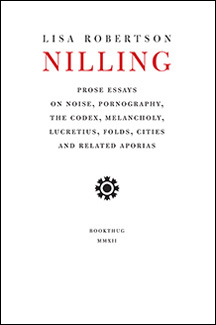 LISA ROBERTSON'S MOST RECENT BOOK Nilling, Bookthug, 2012 Description from the publisher: Nilling: Prose is a sequence of 6 loosely linked prose essays about noise, pornography, the codex, melancholy, Lucretius, folds, cities and related aporias: in short, these are essays on reading. Excerpts from Nilling: EXCERPT 1 I have tried to make a sketch or a model in several dimensions of the potency of Arendt's idea of invisibility, the necessary inconspicuousness of thinking and reading, and the ambivalently joyous and knotted agency to be found there. Just beneath the surface of the phonemes, a gendered name rhythmically explodes into a founding variousness. And then the strictures of the text assert again themselves. I want to claim for this inconspicuousness a transformational agency that runs counter to the teleology of readerly intention. Syllables might call to gods who do and don't exist. That is, they appear in the text's absences and densities as a motile graphic and phonemic force that abnegates its own necessity. Overwhelmingly in my submission to reading's supple snare, I feel love. EXCERPT 2 In the facsimile Oblongus Codex, at the bottom margin on the page containing lines 1140-1159 of the fourth book of De rerum natura, I saw what at first appeared to be the photographed image of a small oval hole about the size and shape of my thumbnail, tidily cut from the vellum of the original. Bordering this ellipse, I saw a faint drawing that added a labial ornamental border around the shape. It seemed that some sort of monkish pornographic doodle had been censored. At closer examination I realized that the elliptical absence had in fact not been cut from the page by some historical censor--it was rather a flaw inherent in the structure of the vellum; the trace of a wound perhaps. Several of these photographed images of material mise-en-abimes appeared as I leafed through the codex. In each case the page was cut from the larger skin so that the scar found its place in a margin, so as not to interfere with the scribe’s work. But here in book four, the scribe had decorated the flaw in the skin with this mildly and endearingly erotic doodle. The tiny absence was animated: a lacework. 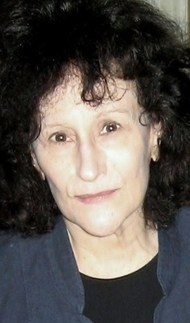 Lynne Tillman Lynne TillmanPhoto by Julia Jackson Lynne Tillman's latest book is Someday This Will Be Funny, a collection of short stories, published by Red Lemonade Press (2012). Her most recent novel is American Genius, A Comedy, published by Soft Skull. She is the fiction editor at Fence Magazine and Professor/Writer-in-Residence in the Department of English at the University at Albany. RUSTY TALK WITH LYNNE TILLMAN Kathryn Mockler: What is your first memory of writing creatively? Lynne Tillman: When I was eight, I wrote a composition about Charlemagne. My class was asked to write just one. But I got carried away, and wrote two. That thrill, rush, gave me a sense of power, freedom, pleasure—an eight year old's version. KM: Why did you become a writer? LT: I don't know why. I could give you reasons, but I really don't know other than to say that, when I was eight and wrote those little compositions, I loved it. I felt I was good at it, and decided right then to be a writer. KM: Could you describe your writing process? LT: I'm erratic. I don't have an everyday practice, except when I want to do it, want to write it, whatever it is. Then I become compulsive, and sit at my desk, at the computer, for hours without moving. Except for getting a cup of tea. But I can forget to eat, and begin to feel heady, dizzy. This is not great for the body, but I love that intensity, concentration, being inside what I'm writing. KM: Rejection or criticism can often stop new writers before they start. Do you have any advice on how to deal with rejection? LT: Rejection is different from criticism. Constructive criticism can help, but sometimes it's hard to handle, especially when you're just beginning to show your work. Rejection can be hell. Writers have to know that. But it's always miserable. I have no advice other than to say we all go through it, and if you can't get through it, you can't show your writing to others for publication. KM: What writers would you recommended to an aspiring writer? Or what writers were influential to you when you first started out? LT: Most important is how you read as a writer, not what you read. Reading crap is just boring. There are many good writers, fewer great ones; but if a writer reads critically, she can learn how it's done, and what she likes or doesn't and why. It aids in making choices if you know there are choices. KM: What is the best literary advice you've gotten that you actually use? LT: "Take your reader by the hand." My older sister told me that when I was 12. KM: Your favourite literary moment, if you have one. LT: Maybe my favourite moment was when the great writer Harry Mathews read aloud a piece I had written anonymously, because I was so insecure, to an audience at St. Mark's Poetry Project. I was astonished, surprised, happy, embarrassed; but it got some laughs, and gave me some courage. KM: What are you working on now? LT: A novel, my sixth, if I ever finish it. Right now I'm calling it Clouds and Apparitions, but Clouds may go. Not sure yet. LYNNE TILLMAN'S MOST RECENT BOOK Someday This Will Be Funny, Red Lemonade, 2011 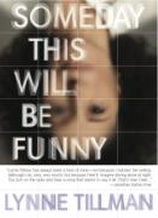 LYNNE TILLMAN AS AUTHOR PHOTO The black-and-white pencil drawing on the reverse of Someday This Will Be Funny shows a woman with a long, oval face, a thin nose, a strong chin, and a cloud of apparently blonde, curly hair. The black-and-white photograph on the flyleaf of the story collection Absence Makes the Heart shows the same woman, twenty-one years ago—the same thin lips, the same elegantly elongated nose. The woman looks like Glenn Close. She looks so much like Glenn Close, especially Fatal Attraction, Alex Forrest–era Glenn Close, that I spend at least fifteen minutes comparing results in Google image search. In color everything is clearer. The woman is Lynne Tillman. It’s funny that for a second I saw Alex Forrest—powerfully, primally, dangerously sexual, a female menace—one of those synaptic errors that later make a sort of sense, a tired brain conflating a time period, a radically direct portrayal of female sexuality, an aureole of hair. Or an error that later will simply be funny. Someday this will be funny. From The Literary Review, "Ruth Curry A Collection of Thoughts on Lynne Tillman, on the Occasion of the Publication of Her Twelfth Book, Someday This Will Be Funny" Lynne Tillman's characters inhabit language the way others live in rooms and cities. It's not that they are made only of words—all literary characters are—or that they don't have their own versions of material longings, needs, attachments, and obstructions. What's different is that they are attuned to language. They fraternize with words even when they are not talking. They treasure clichés and ready-made phrases as if they were messages or hints, turning them over to find their wisdom, or at least the joke wrapped inside them. In her collection This Is Not It (2002), when a woman makes a "last-minute decision," she very soon wonders what a "first-minute decision" would look like. There is an echo of this thought in Tillman's new story collection, Someday This Will Be Funny: "The decisive moment was an indecisive one for her." We instantly start adding up our own moments of that sort, finding far too many. From Bookforum, "Words to Live By: Comic stories interrogate reality, history, and language itself" by Michael Wood Despite the claim of the title, “Someday This Will Be Funny,” you wouldn’t want to reach for Lynne Tillman’s new book just for a good howl. In fact, that “someday” the title promises may never come. Tillman’s stories are too piercing, the obsessions of her characters too connected to their psychic wounds, for them to be considered exactly “funny.” In any case, it isn’t “someday” but rather “meantime” that counts for readers. And in the meantime, Tillman’s fictions tend to be (to steal a line from one of her stories) as “outrageously ineffable, obdurate and evasive” as the forms of desire they describe. Gorgeously at ease and technically virtuosic, the stories are ever on point — on point, that is, if the point of your reading has more to do with psychological nuance and bravura performances of language than with conventional story lines. From The New York Times Sunday Book Review, "Lynne Tillman’s Innovative Stories" by Forrest Gander 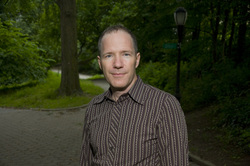 Rick Moody Photo by Thatcher Keats Rick Moody's acclaimed and prizewinning books include the novels Garden State, The Ice Storm, Purple America, The Diviners and The Four Fingers of Death. He has received the PEN/Martha Albrand Award, the Addison Metcalf Award from the American Academy of Arts and Letters, the Paris Review’s Aga Khan Prize, and a Guggenheim Fellowship. He lives in Brooklyn. RUSTY TALK WITH RICK MOODY Kathryn Mockler: What is your first memory of writing creatively? Rick Moody: As opposed to writing non-creatively? I remember attempting to start a novel in 6th grade. Didn't get very far. And there was a poem, in 7th grade, with the same syllabification and rhyme scheme as "Jabberwocky." (Lewis Carroll had just struck a chord with me.) I'm sure there were earlier examples of "creative writing," but I'm not always sure I know what that means. In some ways, all early writing is creative. It's precisely education that teaches us how NOT to write creatively. KM: Why did you become a writer? RM: I got fired from a lot of other jobs. KM: Could you describe your writing process? RM: How I have worked varies from project to project and from decade to decade. Right now, my process is: wait for the semester to end, then write like a maniac, as many hours of the day as are physically possible, bearing in mind the occasional social obligation or need to interact with my daughter. Otherwise: eat and sleep writing and writing-related projects. I don't do it in the same places all the time. I don't do it in the same way from day to day. So there is no science. Be alert to the possibility of language. Follow the language. And revise as much as you can until someone shouts at you that they need the assignment. KM: Rejection or criticism can often stop new writers before they start. Do you have any advice on how to deal with rejection? RM: Always be working on the next thing. KM: What writers would you recommended to an aspiring writer? Or what writers were influential to you when you first started out? RM: Melville Hawthorne Thoreau Joyce Beckett Wolff Faulkner Nabokov Paley Gaddis Barthelme KM: What is the best literary advice you've gotten that you actually use? RM: The only important part is the work. Pay no attention to any part but the work. If you can be content with that part of the job, you will never be disappointed. KM: What are you working on now? RM: A new novel, some stories, a few more essays on music, a poem, and so on. 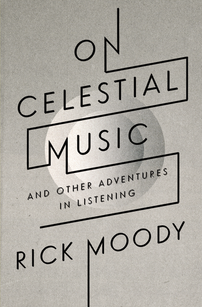 RICK MOODY'S MOST RECENT BOOK On Celestial Music and Other Adventures in Listening, Hachette Book Group, 2012 Description from Hachette Book Group Rick Moody has been writing about music as long as he has been writing, and this book provides an ample selection from that output. His anatomy of the word cool reminds us that, in the postwar 40s, it was infused with the feeling of jazz music but is now merely a synonym for neat. "On Celestial Music," which was included in Best American Essays, 2008, begins with a lament for the loss in recent music of the vulnerability expressed by Otis Redding's masterpiece, "Try a Little Tenderness;" moves on to Moody's infatuation with the ecstatic music of the Velvet Underground; and ends with an appreciation of Arvo Part and Purcell, close as they are to nature, "the music of the spheres." Contemporary groups covered include Magnetic Fields (their love songs), Wilco (the band's and Jeff Tweedy's evolution), Danielson Famile (an evangelical rock band), The Pogues (Shane McGowan's problems with addiction), The Lounge Lizards (John Lurie's brilliance), and Meredith Monk, who once recorded a song inspired by Rick Moody's story "Boys." Always both incisive and personable, these pieces inspire us to dive as deeply into the music that enhances our lives as Moody has done--and introduces us to wonderful sounds we may not know. Read an excerpt of On Celestial Music and Other Adventures in Listening. 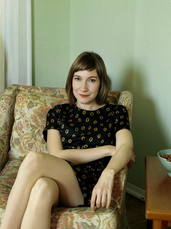 Sheila Heti Sheila Heti lives in Toronto. She works as Interviews Editor at The Believer and is the author of five books: the short story collection, The Middle Stories (McSweeney’s Books); the novel, Ticknor (Farrar, Straus and Giroux); How Should a Person Be? (Anansi) which is forthcoming in the U.S. from Henry Holt in the summer of 2012; an illustrated book for children, We Need a Horse (McSweeney's McMullins) featuring paintings by Clare Rojas; and a book of conversational philosophy with Misha Glouberman called The Chairs Are Where the People Go (Faber and Faber). Her work has been translated into German, French, Spanish, Dutch, Italian, Vietnamese and Serbian. Her writing has appeared in The New York Times, n+1, McSweeney’s, Brick, Geist, Maisonneuve, Bookforum, The Guardian, and other places. She studied playwriting at the National Theatre School in Montreal before attending the University of Toronto to study art history and philosophy. RUSTY TALK WITH SHEILA HETI Kathryn Mockler: What is your first memory of writing creatively? Sheila Heti: I don't have a first memory of writing. Or reading. Or speaking! Or hearing words. KM: What keeps your going as a writer or why do you write? SH: Because not much else makes time feel so bottomless. KM: How would you describe your writing process? How does revision figure into your process? SH: I write it first, then I revise it. Sometimes I revise it right then and there, and sometimes I wait a few weeks, months or years. It depends on the piece and how much in a hurry I am. Sometimes I don't know where I want to go with it. Then I leave it alone. There's always something to work on. I used to only work on one thing at a time, but I like having many things to work on, depending on where my mind wants to be. Now I can always be working. I don't have to be in the mood or any particular mood because if you have ten things on the go, at least one of them will be what you're in the mood for. KM: What influences your writing the most? SH: The time I'm at in my life. KM: What authors or books would you recommended to someone aspiring to be an writer? SH: I would mostly just recommend not reading a book to the end if you're not enjoying it. Forget about how it turns out and go find a book you actually like. I can't believe how people waste time this way, finishing books they're not enjoying. The book doesn't care. God doesn't care. Where does this imperative come from to finish a book one has started? Move on! KM: What is the best thing about being a writer and what is the worst thing? SH: The best thing is doing what you want to do with your life (if that is what you want to do--write) and there is no worst thing. Well, maybe the worst thing is that you don't get to mature in a steady way. It's really lumpy. It's sort of dependent on finishing books. Sometimes if a book takes a long time to finish, like you start it when you're 25 and finished when you're 35, then when you turn 35, you feel more like you're 26. It's hard to believe you're actually 35. 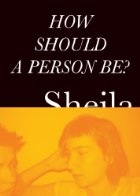 A RECENT BOOK BY SHEILA HETI How Should a Person Be?, House of Anansi Press, 2010 Description from House of Anansi From the internationally acclaimed author of The Middle Stories and Ticknor comes a bold interrogation into the possibility of a beautiful life. How Should a Person Be? is a novel of many identities: an autobiography of the mind, a postmodern self-help book, and a fictionalized portrait of the artist as a young woman -- of two such artists, in fact. For reasons multiple and mysterious, Sheila finds herself in a quandary of self-doubt, questioning how a person should be in the world. Inspired by her friend Margaux, a painter, and her seemingly untortured ability to live and create, Sheila casts Margaux as material, embarking on a series of recordings in which nothing is too personal, too ugly, or too banal to be turned into art. Along the way, Sheila confronts a cast of painters who are equally blocked in an age in which the blow job is the ultimate art form. She begins questioning her desire to be Important, her quest to be both a leader and a pupil, and her unwillingness to sacrifice herself. Searching, uncompromising and yet mordantly funny, How Should a Person Be? is a brilliant portrait of art-making and friendship from the psychic underground of Canada's most fiercely original writer. 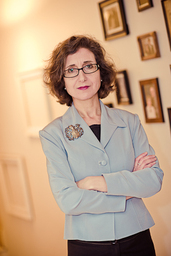 Maria Meindl Photo by Kathryn Palmateer Maria Meindl is the author of Outside the Box: the Life and Legacy of Writer Mona Gould, the Grandmother I Thought I Knew from McGill-Queens University Press, a story “The Last Judgment” from Found Press and “Rules” an essay in an anthology on death published by Creative Non Fiction. Her essays have appeared in The Literary Review of Canada, Descant and Musicworks. She has made two radio series for CBC Ideas: Parent Care, and Remembering Polio. She is the founder of the Draft Reading Series (now in its seventh season) which features work by new and established writers. Maria Meindl has two London readings this week: The University of Western Ontario November 23, 2011 @ 12:00pm to 1:00pm, North Campus Building, 2nd Floor room 295 Fanshawe College November 24, 2011 @ 2:00pm to 3:00pm, Room D1060, 1001 Fanshawe College Blvd. RUSTY TALK WITH MARIA MEINDL Kathryn Mockler: How did you first come to writing? Maria Meindl: As a small child I spent a lot of time with my grandmother, who had been a well-known poet, journalist and broadcaster from the 1930s to the 1950s. Right around the time I was born she was disappearing from the public eye. She felt hurt and bitter about it and planted all her hopes on me. It was a given that I would follow in her footsteps. It never occurred to me that I had a choice. At the age of eight I wrote a poem, which felt like it came to me by divine inspiration. My grandmother said it was a tour-de-force, my teacher praised it as “sensitive,” and a lifetime of literary misery was born. I felt I had to fulfill my destiny as a writer, yet I gave myself no room to experiment, no permission to fall on my face. Furthermore I was a one-trick “sensitive” pony; anger, sexuality, clear and incisive thought all fell outside my very limited range. Oh, and tyrannized by that “divine inspiration,” I was afraid to roll up my sleeves and rewrite anything. It took years--and I mean years--to get over it. I started writing at the age of eight and published my first book, Outside the Box, this September at the age of 52. By the way it’s about my grandmother and our relationship. KM: What keeps you going as a writer--especially when you are working on a project that is years in the making? MM: I’m a very, very determined person, and I hate to give up. It’s in my nature, or deeply conditioned. I should say that this is not a healthy quality in most circumstances. If you only knew the horrible relationships and bad jobs I have spent years trying to “fix”! For my emotional and physical health, I have had to learn to turn my tenacity off at times and cut my losses, but it is a strength when it comes to writing, especially when your projects take twelve years to finish. (This was the case with Outside the Box.) I should also say I think that tenacity can be learned if you don’t have it. KM: What is the writing process like for you? Is it different when you are writing in different genres? MM: For Outside the Box, all the fraught history with my grandmother seemed to infuse the process I felt like my brain was bleeding most days when I’d been working on it, and this went on for years. But I got through it. Lately I have also been writing fiction. A totally different experience. It is joyful, though all writing comes hard to me and fiction is no exception. This may be because in the past few years I have been exploring movement and voice. I don’t feel a direct link with the writing process, but I do feel my writing has become more embodied, sexier and more fun. Also I am less cautious and more direct in the way I say things. KM: How do you approach revision? MM: I am much better about revision than I used to be. Once I get past my usual “oh my God it isn’t perfect!” panic I enjoy it. It’s oh so satisfying to dig into the richness of the initial draft and feel it transform into something more evolved. It also helped to take a philosophy degree as a mature student. We would critique each other’s papers minutely, but there was something good-natured and co-operative about the process. In that context, it’s known that by critiquing someone’s work, you help them reinforce their argument because you help them anticipate what others might say. When I applied this to creative writing the whole process got easier. Now I consider any and all critiques, no matter how they are presented. I have had some wonderful editing, especially on Outside the Box, but I’ve endured a lot of pure, unconsidered meanness over the years, and I’m sure it’s not over yet. I don’t care any more. If the editor can’t be diplomatic, it’s not my problem; meantime, the work improves, and I get the credit anyway. KM: How did you deal with rejection when you first started out? MM: Um, how about now? I am and have always been devastated by rejection. I take it personally, and it brings up painful rejection issues from my past. It’s getting worse and not better with time. However…I don’t let that stop me! My method is as follows: when something is rejected, I stop working and go into mourning for 24 hours. I allow myself to be overwhelmed with my darkest self-doubts. I resolve to quit. Next day, I consider the editor’s comments carefully (if I’ve been lucky enough to get them). I make changes if necessary. Then I put it BACK IN THE MAIL. I wrote a story in 1986 called “The Last Judgment.” I began submitting it to literary magazines. It was rejected about 20 times, always with the comment that it was too long. Each time I was flattened. I kept sending it. Last year it was accepted by Found Press, which does really good and innovative e-publications, and which treats short stories like books, with all the attendant publicity and marketing (and an advance). It was the ideal length for Found Press. KM: What authors or books would you recommend, especially to creative nonfiction writers? MM: I have read some great Canadian nonfiction. Recent favourites have been The Year of Finding Memory by Judy Fong Bates, The Boy in the Moon by Ian Brown, anything by Marni Jackson. I was very affected by Dreams from My Father by Barack Obama: such a beautifully written book and an ideal balance between anecdotes and thoughtful analysis. Also, I keep returning to Silences by Tillie Olsen--not only for the content but the unique structure. KM: Do you have a piece of advice for new writers? MM: The literary community needs you, NOW, no matter how inexperienced, awkward, over-committed or downright weird you think you are. I have run a reading series (Draft) for seven years now and our volunteers are like gold. We cannot do without them, and we always need more. Get involved with something--publications, events, or whatever you like. Or start something. The big established organizations we have now began with a few people who gathered together in a basement or departmental lounge of their university and made things happen. They made mistakes and learned along the way. You will have a lot more fun and the more people who do this, the bigger, more welcoming and more diverse the literary scene will be. KM: Your funniest literary moment, if you have one? MM: My authors’ copies of Outside the Box were delivered on the front porch at one and the same moment as the earthquake in Toronto August 23, 2011. KM: What are you working on now? MM: I’m writing a series of three novels working back through history from 1980s Toronto to post-WW2 London to Weimar Berlin. Isn’t it nice that I’ve got over putting too much pressure on myself? 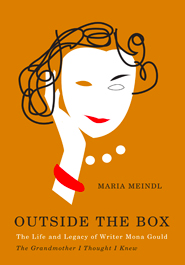 MARIA MEINDL'S RECENT BOOK Outside the Box, McGill-Queen's University Press, 2011 Description from McGill-Queen's: When poet and broadcaster Mona Gould died in 1999, she left behind thirty-eight boxes of papers. Her war poem, "This Was My Brother," was still a staple of textbooks and anthologies, yet Mona - well known in her youth - had fallen into obscurity in the 1960s. Born at the very time Mona's career was faltering, Maria Meindl became a captive audience for her grandmother's extravagant stories of the past. Years later, Maria took on the daunting task of sorting through Mona's mountain of papers to create an archive for the University of Toronto's Fisher Rare Book Library. The chaotic state of the boxes reflected Mona's flamboyant and demanding personality, yet they also drew an important picture of the life of a Canadian freelancer in the twentieth century. Mona had begun publishing poetry and features in newspapers in the 1920s and published three books of poetry in the 1940s. In the 1950s, at a time when many women were retreating from the public sphere, she had a successful radio career. Her later journals and letters recount, in agonizing detail, a downward spiral into self-doubt, poverty, and addiction. Maria soon discovered that the truth of Mona's life was even more fascinating than her stories. Outside the Box brings to life a thinly documented era in Canadian letters through the story of one passionate and conflicted woman. It also charts the journey of an unwilling archivist, coming to terms with family secrets, forgotten history, and the stories that are never told. Review quotes "Not content merely to provide an account of Gould's life and times, Maria Meindl probes the complexities of her own relationship with this remarkable woman. I thoroughly enjoyed this book and found it rewarding on multiple levels." Susan Olding, author of Pathologies: A Life in Essays "Encompassing literary, social, and women's history, personal memoir, and media studies, Outside the Box is honest, revealing, and original." Elaine Kalman Naves, author of Shoshanna's Story 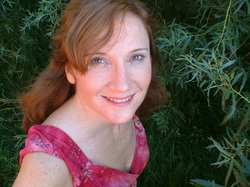 Laurie Gough Laurie Gough Lauded by Time magazine as "one of the new generation of intrepid female travel writers," Laurie Gough is author of the recently released Kiss the Sunset Pig, and Kite Strings of the Southern Cross, shortlisted for the Thomas Cook Travel Book Award, and silver medal winner of ForeWord Magazine's Travel Book of the Year in the US. Twenty of her stories have been anthologized in various literary travel books, including Salon.Com's Wanderlust: Real-Life Tales of Adventure and Romance; AWOL: Tales for Travel-Inspired Minds; Sand in My Bra: Funny Women Write From the Road; Hyenas Laughed at Me and Now I know Why: The Best of Travel Humor and Misadventure; and A Woman's Passion for Travel. Besides being a regular contributor to The Globe and Mail, she has written for salon.com, The L.A. Times, The National Post, Outpost, Canadian Geographic, and numerous literary journals. Gough is married, has a little boy, lives in Wakefield, Quebec (and sometimes San Miguel de Allende, Mexico) and likes traveling to places where she fantasizes living some day. RUSTY TALK WITH LAURIE GOUGH Melanie Chambers: What constitutes bad travel writing/ good travel writing? Laurie Gough: A common mistake aspiring travel writers make is going on a trip and writing about it and assuming everyone will be interested in what you’ve written just because you’ve been to some place exotic. You have to assume the opposite: nobody is interested. It’s like showing someone your travel slides or making people read your day-by-day travel journal or blog. Simply writing what you did each day of your trip is not interesting. You have to tell a story. Oh, and clichés kill a travel story. Good travel writing draws the reader in from the very first sentence. The story is especially interesting if there’s a quest, either internal or external of a combination of the two. If there’s internal struggle and reflection going on within the narrator, all the better. A good story leads the reader into the wonder and terror of the place, bringing that place alive with concrete original details. You want the reader to feel as if they’re there, with atmosphere all around them. MC: How do you come up with story ideas? What draws you to a topic? LG: Sometimes I don’t know what my story is until I’m half-way through a trip. Sometimes I don’t know until weeks after I get home and have time to reflect on my trip and come to see it more clearly. I start to see it as a story that could read like a novel with a story arc, full of the characters and plot twists. Usually you won’t know what your story is before your trip, even if you think you do. It’s really exhilarating though when an idea just hits you out of nowhere while you’re travelling and you know you have a story to write. You really start to live in the moment because you’re noticing details you might be writing about. Time slows down and your senses sharpen. You have to be much more aware than you would otherwise. I’m drawn to the underbelly of a place, and to seeing how people interact with each other in different cultures. I’m also always interested in how much we’re defined by our culture. When I have a strong reaction about something in a different culture, I think, is this me or is this my culture? When we travel we come up against so many things that are difficult, but mainly we come up against ourselves. I’m interested in what happens at the point when two cultures meet. What do they take from each other? MC: What is your routine for a perfect writing day? LG: Before I had a baby, I’d stay up till 4 am writing. Now I have to write when I can. I guess my perfect writing day would mean being all alone in a cabin in the woods with no distractions and books all around me for inspiration. Oh, and dark chocolate nearby of course! MC: What authors would you suggest --about five or more--new travel authors read? LG: It’s funny. I read constantly but I don’t find myself reading a lot of travel books lately. I really like anything that evokes a strong sense of place and time. I also like books that make me laugh. I love the short stories of Lorrie Moore. She’s really quirky, and I love the memoir writer David Sedaris. I just read “Prisoner of Tehran by Marina Nemat which is excellent. Bill Bryson’s “The Life and Times of the Thunderbolt Kid” really brings 1950s Iowa alive (who would have thought this could be interesting but it is!). I also like Alice Munro and Brian Doyle. An amazing book is “Cloud Atlas” by David Mitchell. It’s so important to feed your mind with good writing, if you want to write. Look what authors do and learn from them. Books are your best teachers. MC: How did you get into travel writing? LG: I travelled through much of my 20s and always kept travel journals. I never realized my travels would turn into books. I just liked writing in my journal because it felt good and I wanted to remember all the eccentric people I was meeting and strange circumstances I was forever encountering. But after living in Fiji and returning to Canada, I woke up one night in the middle of a snowstorm with a panicky feeling that my travels were evaporating. I got up immediately and started writing a story about Fiji. I spent the rest of the night writing that story and just kept going after that. Soon I realized I was writing a book. I also started my writing career before the internet really took off (travel blogs etc.) so I was lucky. Travel writing is a hard sell, but if you have a passion for both travelling and writing, it’s amazing to be able to put these two passions together. People are travelling more now than ever before and want to read travel writing as much as they ever did. MC: What are you working on right now? LG: I was recently in Bhutan, a country in the Himalayas, which measures its citizens Gross National Happiness. I’m writing an article called Pondering Happiness in Bhutan. It’s hard work but also exhilarating and fun. 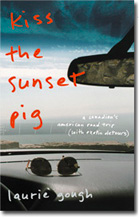 LAURIE GOUGH'S MOST RECENT BOOK Kiss the Sunset Pig, Penguin Canada, 2006 Penguin USA, 2006 Description from Laurie Gough's website: In a beater car named Marcia, Gough reflects on a life spent traveling as she heads west across the USA towards her dreamland of California. Back in her early twenties, she lived in a cave on a beach in California and found purpose in life, listening to the waves in the moonlight. The trouble is, now she has lost that enthusiasm. As Gough makes her way across the country meeting a colorful variety of characters and heading towards that half-remembered cave, she recalls past adventures around the world-coming face to face with a ghostly crone on a Greek island; braving the jungles of Sumatra; paddling down the Yukon River; teaching native kids in Canada's sub-arctic; getting lost in Seoul, found in Thailand, and out of her head in Jamaica. As Gough closes in on the place of her dreams, she peels back the layers of cynicism that life builds around us, and finds that our old selves may still be inside us if only we bother to look. Read Excerpts Hard class across Sumatra (Globe and Mail, May 20, 2006) Love Under the Midnight Sun (National Post, June 3, 2006) Early Reviews "Kiss the Sunset Pig is a wonderful read that captures the delightfully insane spontaneity of travel. (Gough) manages the perfect mixture of humor and poignancy with the frightening and bizarre, all lyrically told and at times, poetic. A gifted storyteller, she writes a book very difficult to put down." CBC Radio "Reading this book is like spending a glorious weekend reminiscing with a funny, intelligent, and well-travelled friend. Her vivid descriptions of the highs and lows, the people she meets and the real lives she steps into, are at turns, gripping, witty, profound and inspiring. An enjoyable read." Real Travel magazine (UK) "Part memoir, part travelogue, Kiss the Sunset Pig is a lovely exploration into a person's search for a home. (Gough) has the ability to situate a reader in a foreign landscape with the kind of vivid description that makes it possible to feel the land under her feet and to smell the air she is breathing." The Globe and Mail "Gough has a gift for self-deprecatingly wry humour. Her retelling of her ride on the Indonesian 'Bus of Death, Debauchery and Discomfort' is a true gem." Winnipeg Free Press "No ordinary American travelogue, Kiss the Sunset Pig is an insightful, personal odyssey." Outpost magazine "Thought-provoking, bursting with life and gorgeous in its descriptions of far-flung destinations, Kiss the Sunset Pig is a transporting read to be enjoyed on planes, trains and kayaks. And if you've been there, done that and bought the semi-detached, curl up with this book on your living room sofa for one last adventure by proxy." Ukula magazine "Kiss the Sunset Pig is elegant, funny and poignant. I couldn't bear it to end." Polly Evans, UK author of Fried Eggs with Chopsticks, and It's Not About the Tapas "Through tales of awe, exasperation and much humour, Gough drives the reader home." The Ottawa Citizen "In Naxos Nights the author brilliantly contrives to engage the reader so forcefully, it becomes impossible to put the story aside at the finish. It's a tale to savor, to read and re-read." From the judges of the 2006 Tom Howard/John H. Reid Short Story Contest (where Naxos Nights has won second prize in a nation-wide contest in the U.S.) "Kiss the Sunset Pig is a not just a traveler's travel book. Whether you journey from the comfort of your armchair, or you're on-the-move with a knapsack, Sunset Pig will remind you why we travel, dream, and live. Unlike many writers who use travel as a meditation on home, Gough's travels are meditations on identity. This gives the book a mythical quality: The reader is drawn into Gough's inner journey, where her cumulative wisdom is revealed tantalizingly slowly through each travel segment, the way a waking mind pieces together a profound dream, bit by luscious bit. Like conversing with an old, dear friend, reading Kiss the Sunset Pig is inspiring and enlivening. With her uncompromising need to explore her world, Gough inspires the reader to live an authentic, full life, to expand with the universe, and find her way back home." Woman's Post "Kiss the Sunset Pig - a frequently funny, sporadically profound account of Laurie Gough's drive west across America. Five out of five stars." Traveller Magazine (UK) "Gough is a fearless and inveterate solo traveller who thinks nothing of hitchhiking or grabbing a second-class bus to her destination, or throwing down her sleeping bag on the beach once she gets there..There are several refreshing things about this book but mostly, I liked Gough's down-to-earth, unhurried, unassuming tone and the way in which the stories simply unfold, as if you were listening to them while sitting around a campfire with a bottle of wine." Vancouver Sun "Laurie Gough's writing is often intimate and always inviting. Even those who have never gravitated towards travel writing will be pleasantly surprised by the fresh and intriguing view of the world that Laurie Gough offers in Kiss the Sunset Pig." Marcie McCauley, Author and Reviewer "The way she writes about California is reason enough to pick up the book." Sunset magazine (US) 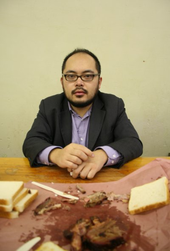 Kevin Chong Kevin Chong is the author of four books, most recently a novel entitled Beauty Plus Pity and a non-fiction book on horse-racing. His writing has appeared in the Globe and Mail, The Walrus, The TorontoStar, Maclean's, Chatelaine, FASHION, Vancouver Magazine, and the CBC Arts website. He's an editor at Joyland.ca and teaches Creative Writing at UBC. RUSTY TALK WITH KEVIN CHONG Kathryn Mockler: How did you first come to writing? Kevin Chong: In my teen years, I fancied myself an intellectual type with literary aspirations.I don't think a lot has changed except that I got older, started writing. KM: What keeps you going as a writer? KC: On tough days, I daydream about becoming a train conductor or lab technician, but then I realize I am 36 and completely unemployable. KM: What is the revision process like for you? KC: I need to take the book as far as I can then find someone to tell me hard truths that I don't want to face about my work. Then I need to strategize: think about the best way to tackle big picture stuff. Then I sit down and rework the piece, point by point. I don't start a new draft from a fresh computer file like some people I know; filling up one doc file can be hard enough. KM: How did you deal with rejection when you first started out? KC: I still deal with it! You tell yourself that people have different points of view and different motives for publishing work, and that it may not be your fault. Then you start to think which parts of that feedback is irrelevant, or whether it is worth your time to alter your work to suit a certain market. KM: A piece of literary advice for new writers? KC: Don't buy into the myth of what a writer's life should be. It may or may not include fancy galas, drinking whiskey, or working in seclusion in a log cabin. Those are all cliches unto themselves. Just do the work of writing, and you will lead a writer's life. 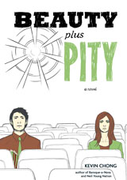 KEVIN CHONG'S MOST RECENT BOOK Beauty Plus Pity, 2011 Arsenal Pulp Press Description from Arsenal Pulp Press "Beauty plus pity—that is the closest we can get to a definition of art." —Vladimir Nabokov In this tragicomic modern immigrant's tale, Malcolm Kwan is a slacker twentysomething Asian-Canadian living in Vancouver who is about to embark on a modelling career when his life is suddenly derailed by two near-simultaneous events: the death of his filmmaker father, and the betrayal of his fiancée who has left him. Soon he meets Hadley, the half-sister he never knew existed―the result of his father's extramarital affair―and as their tentative relationship grows, Malcolm is forced to confront his past relationships with women, including his own mother, an art teacher working through her grief as well as her resentment at her son befriending her husband's daughter. |
Rusty Talk
Rusty Talk Editor: Archives
November 2017
Categories
All
|

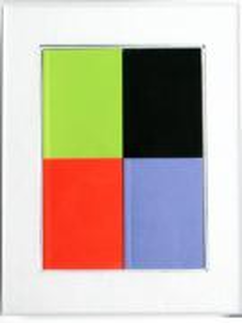
 RSS Feed
RSS Feed
